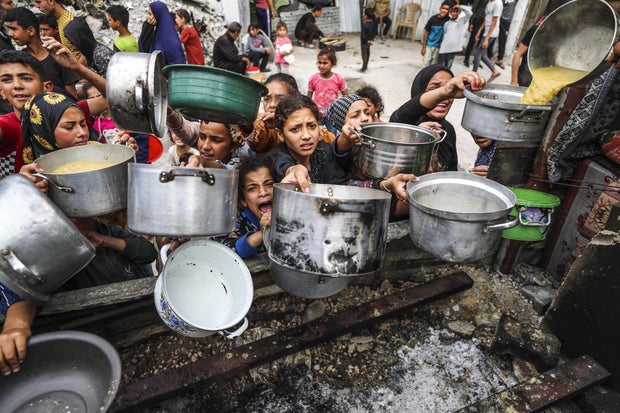Israeli strikes killed at least 52 people in the Gaza Strip on Monday, including some 36 in a school-turned-shelter that was struck as people slept, igniting their belongings, according to local health officials. The military said it targeted militants operating from the school.
Israel renewed its offensive in March after ending a ceasefire with Hamas. It has vowed to seize control of Gaza and keep fighting until Hamas is destroyed or disarmed, and until it returns the remaining 58 hostages, a third of them believed to be alive, from the Oct. 7, 2023, attack that ignited the war.
The strike on the school in the Daraj neighborhood of Gaza City also wounded more than 55 people, said Fahmy Awad, head of the Hamas-run Gaza Health Ministry’s emergency service. He said a father and his five children were among the dead. He said the school was hit three times while people slept, setting their belongings ablaze.
Dawoud Abo Alkas / Anadolu via Getty Images
The Israeli military said it had targeted a militant command and control center inside the school that Hamas and Islamic Jihad used to gather intelligence for attacks. Israel blames civilian deaths on Hamas because it operates in residential areas, adding that “numerous steps were taken to mitigate the risk of harming civilians,” according to French news agency AFP.
Israel says it plans to seize full control of Gaza and facilitate what it describes as the voluntary migration of its over 2 million inhabitants, a plan that has been rejected by Palestinians and much of the international community.
Israel’s military campaign has destroyed vast areas of Gaza and internally displaced some 90% of its population. Many have fled multiple times.
Hamas-led militants killed some 1,200 people, mostly civilians, and abducted 251 people in the 2023 terrorist attack. More than half the hostages have been returned in ceasefire agreements or other deals, eight have been rescued, and Israeli forces have recovered the remains of dozens more.
The offensive has destroyed vast areas of Gaza, rendering entire neighborhoods uninhabitable. Hundreds of thousands of people have been forced to shelter in schools and squalid tent camps for well over a year.
Israel’s retaliatory offensive has killed around 54,000 Palestinians, according to the Hamas-run Gaza Ministry of Health. It says more than half the dead are women and children but does not distinguish between civilians and combatants in its count.
Growing concern over food shortages in Gaza
Israel began allowing some humanitarian aid into Gaza last week after blocking all food, medicine, fuel or other goods from entering for 2-1/2 months. But aid groups say the supplies that have come in are nowhere near enough to meet the mounting needs of the enclave’s residents.
U.N. World Food Program Executive Director Cindy McCain said Sunday on the CBS News’ “Face the Nation with Margaret Brennan” that the number of aid trucks allowed to enter Gaza last week was only a “drop in the bucket” compared to what’s needed to stave off potential famine in the Palestinian territory.
A new aid system, supported by Israel and the United States but rejected by U.N. agencies and other aid groups, is expected to begin operations as soon as Monday, despite the resignation of the American who was supposed to lead the effort, who said it would not be able to operate independently.
Israel plans to roll out the new aid distribution system, run by a group known as the Gaza Humanitarian Foundation and made up of former humanitarian, government and military officials, to set up distribution points guarded by private security firms. Israel has long accused Hamas of siphoning off aid supplies brought into Gaza, without providing evidence.
Mahmoud ssa/Anadolu/Getty
The foundation said in a statement that it would begin delivering aid Monday and would reach a million Palestinians — around half of Gaza’s population — by the end of the week.
U.N. agencies and major aid groups have refused to cooperate with the planned U.S.-backed system, saying it would force even more displacement, fail to meet local needs and violate humanitarian principles that prohibit a warring party from controlling humanitarian assistance. They also say there is no evidence of systematic diversion of aid by Hamas or other armed groups.
Jake Wood, the American heading the foundation, unexpectedly resigned Sunday, saying it had become clear that the foundation would not be allowed to operate independently. It’s not clear who is funding the group. The foundation said in a statement Monday that it would “not be deterred” by Wood’s resignation and would begin its delivery as planned.







